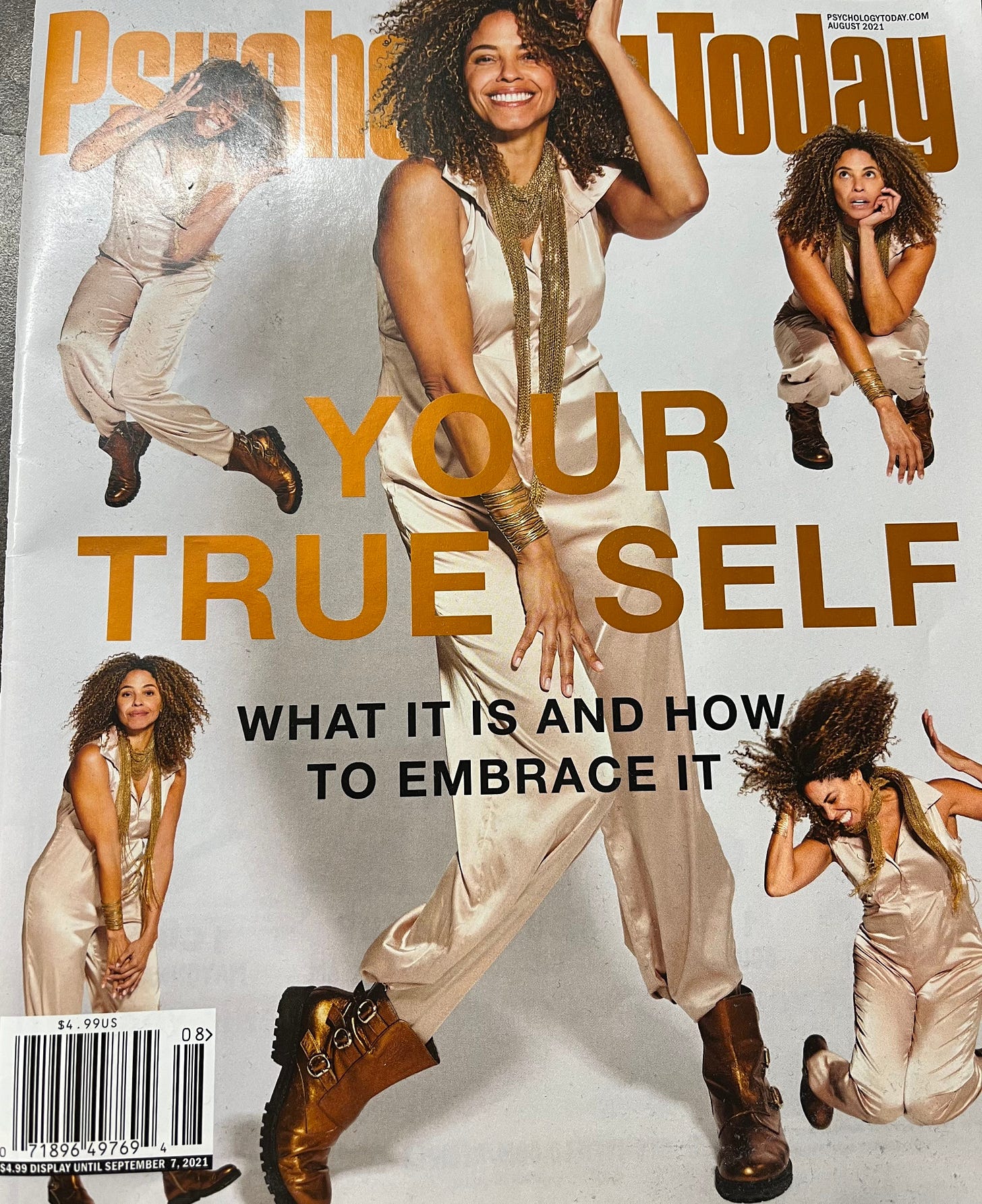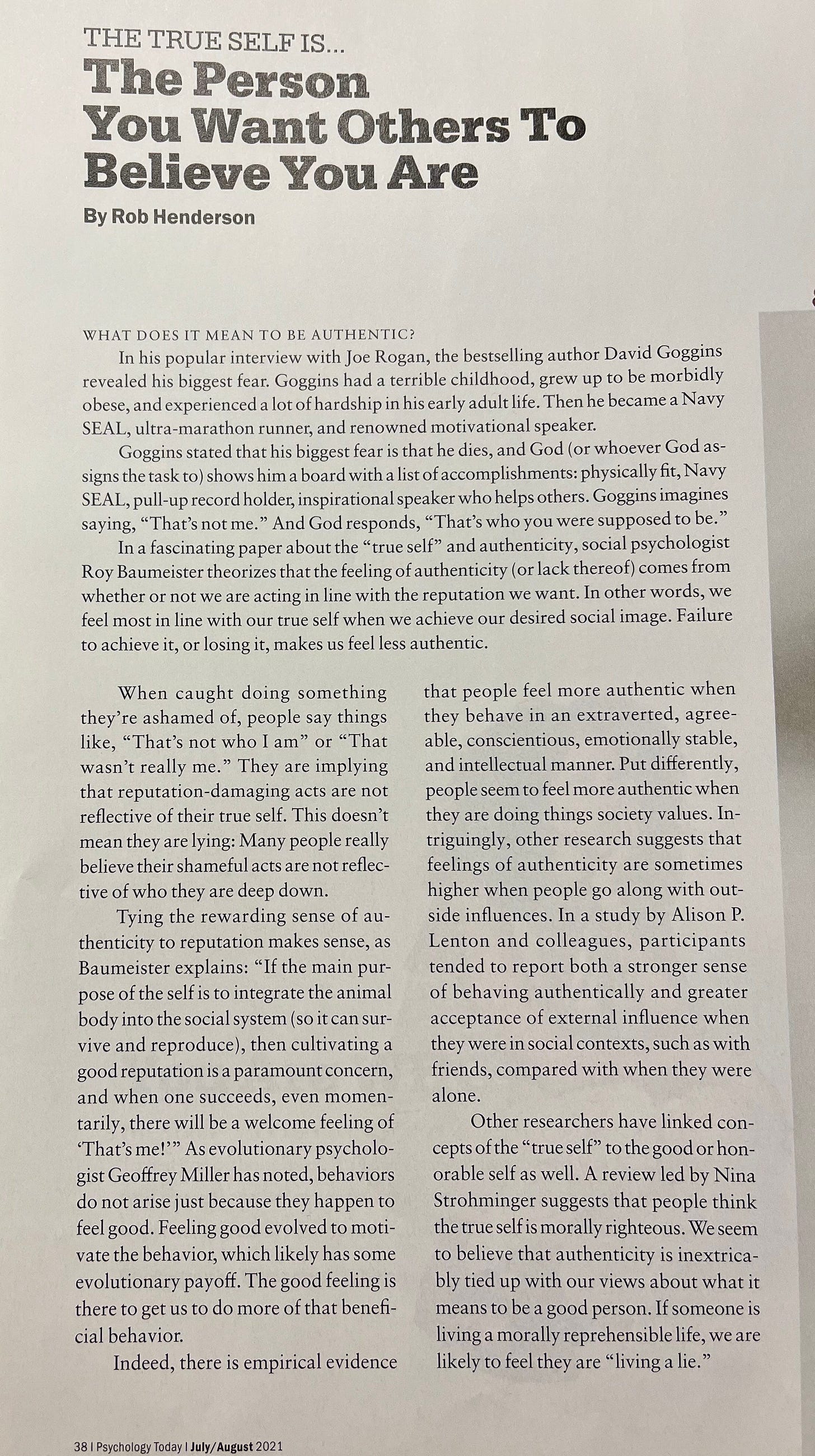The True Self is the Person You Want Others to Believe You Are
The psychology of authenticity
What does it mean to be authentic?
In his popular interview with Joe Rogan, the bestselling author David Goggins revealed his biggest fear. Goggins had a terrible childhood, grew up to be morbidly obese, and experienced a lot of hardship in his early adult life. Then he became a Navy SEAL, ultra-marathon runner, and renowned motivational speaker.
Goggins stated that his biggest fear is that he dies, and God (or whoever God assigns the task to) shows him a board with a list of accomplishments: physically fit, Navy SEAL, pull-up record holder, inspirational speaker who helps others. Goggins imagines saying, “That’s not me.” And God responds, “That’s who you were supposed to be.”
In a fascinating paper about the “true self” and authenticity, social psychologist Roy Baumeister theorizes that the feeling of authenticity (or lack thereof) comes from whether or not we are acting in line with the reputation we want. In other words, we feel most in line with our true self when we achieve our desired social image. Failure to achieve it, or losing it, makes us feel less authentic.
When caught doing something they’re ashamed of, people say things like, “That’s not who I am” or “That wasn’t really me.” They are implying that reputation-damaging acts are not reflective of their true self. This doesn’t mean they are lying: Many people really believe their shameful acts are not reflective of who they are deep down.
Tying the rewarding sense of authenticity to reputation makes sense, as Baumeister explains: “If the main purpose of the self is to integrate the animal body into the social system (so it can survive and reproduce), then cultivating a good reputation is a paramount concern, and when one succeeds, even momentarily, there will be a welcome feeling of ‘That’s me!’”
As evolutionary psychologist Geoffrey Miller has noted, behaviors do not arise just because they happen to feel good. Feeling good evolved to motivate the behavior, which likely has some evolutionary payoff. The good feeling is there to get us to do more of that beneficial behavior.
Indeed, there is empirical evidence that people feel more authentic when they behave in an extraverted, agreeable, conscientious, emotionally stable, and intellectual manner. Put differently, people seem to feel more authentic when they are doing things society values. Intriguingly, other research suggests that feelings of authenticity are sometimes higher when people go along with outside influences. In a study by Alison P. Lenton and colleagues, participants tended to report both a stronger sense of behaving authentically and greater acceptance of external influence when they were in social contexts, such as with friends, compared with when they were alone.
Other researchers have linked concepts of the “true self” to the good or honorable self as well. A review led by Nina Strohminger suggests that people think the true self is morally righteous. We seem to believe that authenticity is inextricably tied up with our views about what it means to be a good person. If someone is living a morally reprehensible life, we are likely to feel they are “living a lie.”
Is our true self just a sheep that goes along with what society expects us to do?The true self, Baumeister and other researchers suggest, isn’t actually a real thing: It’s an idea and an ideal.
The true self is how we fondly imagine we could be. When we act in accordance with that ideal, then we think, That’s who I am. When we stray from it, we think, That’s not me.
A related idea has been discussed by the psychologist and relationship researcher Eli Finkel, who talks about the Michelangelo phenomenon. “In Michelangelo’s mind,” Finkel writes, “the David existed within the rock before sculpting began.” The idea is that in healthy marriages, each partner helps foster the other’s best self.
But Baumeister’s idea is that we have our own vision of our best self (which we believe is our true self) and feel more authentic when we act closer to that ideal. What people think of as their true self is the version of themself that holds a solid reputation. The idealized self that makes a positive impression on peers they respect. When they inch closer to that ideal, they will feel good—and authentic.
This article originally appeared in Psychology Today under the title "The True Self is...The Person You Want Others To Believe You Are."




When we violate our own moral codes, we are not being true to ourselves. But that doesn't mean we aren't being our true selves. Everything we do is part of our true self - even the bad stuff.
Excellent exploration of authenticity and the true self. Would love to read more of your research, thoughts and ideas about it.
Honestly I was surprised when the article ended; it felt premature and like you were just hitting stride at the end of this essay.
I vote for more on this topic — lots to unpack here!